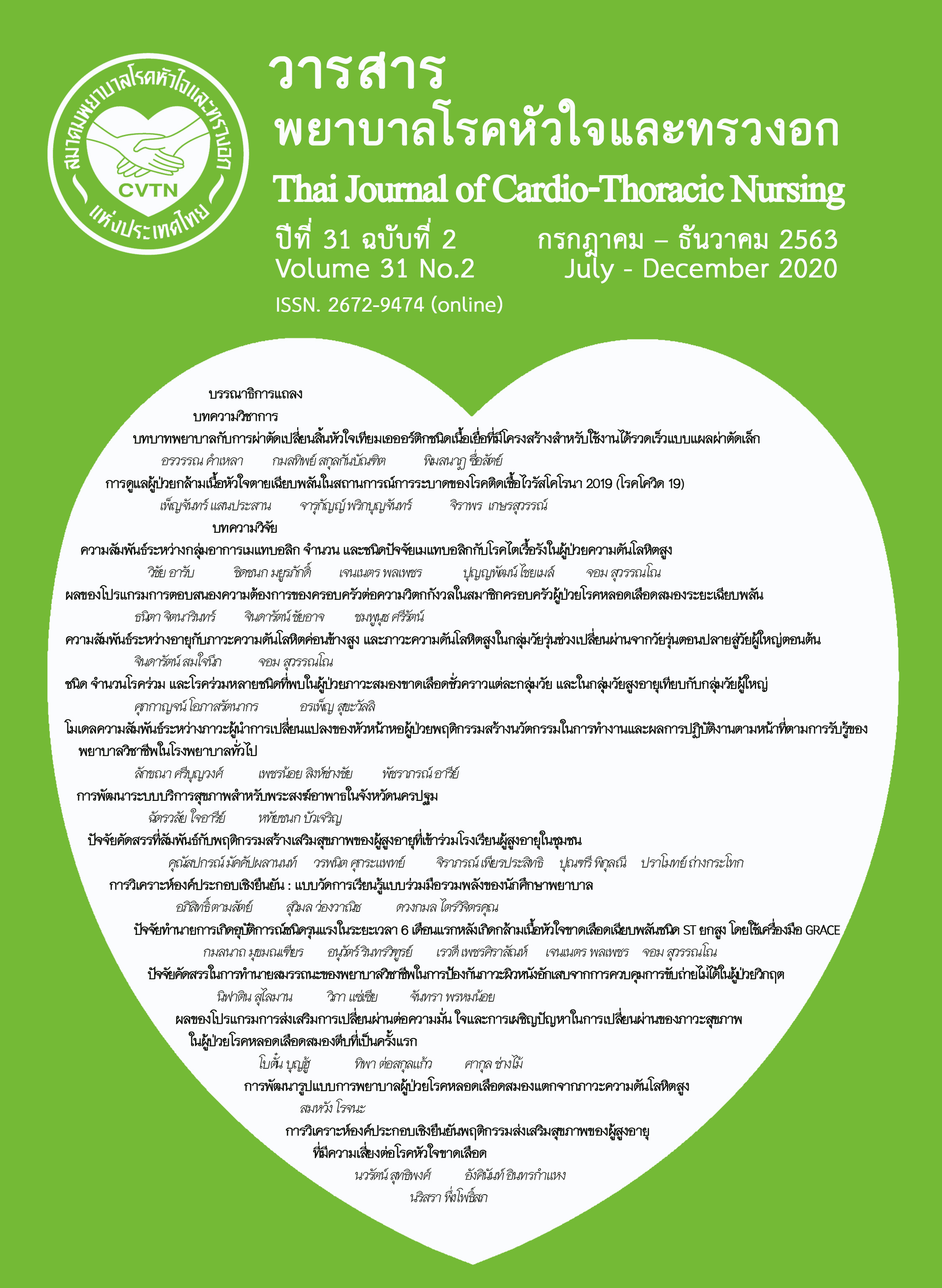ผลของโปรแกรมการส่งเสริมการเปลี่ยนผ่านต่อความมั่นใจและการเผชิญปัญหาในการเปลี่ยนผ่านของภาวะสุขภาพในผู้ป่วยโรคหลอดเลือดสมองตีบที่เป็นครั้งแรก
คำสำคัญ:
ผู้ป่วยโรคหลอดเลือดสมองตีบ, ความมั่นใจ, การเผชิญปัญหา, การเปลี่ยนผ่านของภาวะสุขภาพบทคัดย่อ
การวิจัยนี้เป็นการวิจัยกึ่งทดลอง แบบสองกลุ่มวัดผลก่อนและหลังการทดลอง มีวัตถุประสงค์เพื่อศึกษาผลของโปรแกรมการส่งเสริมการเปลี่ยนผ่านต่อความมั่นใจและการเผชิญปัญหาในการเปลี่ยนผ่านของภาวะสุขภาพในผู้ป่วยโรคหลอดเลือดสมองตีบที่เป็นครั้งแรก กลุ่มตัวอย่างได้แก่ ผู้ป่วยโรคหลอดเลือดสมองตีบหรือตันที่เป็นครั้งแรกที่เข้ารับการรักษาในหอผู้ป่วยโรคหลอดเลือดสมอง โรงพยาบาลสมุทรสาครจำนวน 66 ราย แบ่งเป็นกลุ่มทดลองกับกลุ่มควบคุมกลุ่มละ 33 ราย กลุ่มทดลองได้รับโปรแกรมการส่งเสริมการเปลี่ยนผ่านของภาวะสุขภาพเป็นระยะเวลา 5 วันขณะอยู่ในโรงพยาบาลและ 4 สัปดาห์หลังจำหน่ายกลับบ้าน กลุ่มควบคุมได้รับการพยาบาลตามปกติ เครื่องมือที่ใช้ในการเก็บรวบรวมข้อมูลได้แก่ แบบบันทึกข้อมูลส่วนบุคคล แบบประเมินความมั่นใจและแบบประเมินการเผชิญปัญหาของผู้ป่วยโรคหลอดเลือดสมองตีบ เครื่องมือที่ใช้ในการทดลอง ได้แก่ โปรแกรมการส่งเสริมการเปลี่ยนผ่านของภาวะสุขภาพในผู้ป่วยโรคหลอดเลือดสมองตีบที่เป็นครั้งแรกวิเคราะห์ข้อมูลด้วยสถิติเชิงพรรณนาและสถิติ Repeated measures ANOVA และ ANCOVA
ผลการวิจัยพบว่า กลุ่มทดลองภายหลังได้รับโปรแกรม 4 สัปดาห์หลังจำหน่ายมีคะแนนเฉลี่ยความมั่นใจมากกว่ากลุ่มควบคุมอย่างมีนัยสำคัญทางสถิติ (F1,64=12.66, p<.05) และคะแนนเฉลี่ยการเผชิญปัญหาของกลุ่มทดลองมากกว่ากลุ่มควบคุมอย่างมีนัยสำคัญทางสถิติ (F1,63=338.77, p<.05) โดยใช้วิธีการเผชิญปัญหาด้านการบรรเทาความรู้สึกมากกว่ากลุ่มควบคุมอย่างมีนัยสำคัญทางสถิติ (p<.05)ไม่พบความแตกต่างของการใช้วิธีการเผชิญปัญหาด้านการมุ่งแก้ปัญหา และด้านการจัดการอารมณ์ (p>.05)
ผลการวิจัยนี้แสดงให้เห็นว่า โปรแกรมการส่งเสริมการเปลี่ยนผ่านของภาวะสุขภาพสามารถเพิ่มความมั่นใจและส่งเสริมการเผชิญปัญหาของผู้ป่วยโรคหลอดเลือดสมองตีบที่เป็นครั้งแรกได้ จึงมีข้อเสนอแนะว่าพยาบาลวิชาชีพควรนำโปรแกรมนี้ไปใช้เพิ่มเติมจากการพยาบาลตามปกติเพื่อเพิ่มคุณภาพในการให้การพยาบาลผู้ป่วยโรคหลอดเลือดสมองตีบต่อไป
เอกสารอ้างอิง
World Stroke Organization. World stroke organization strategy 2016-2020. [Internet]. 2018. [cited 2018 October 25]. Available from: https://www.Worldstroke.org/images/WSO_strategy _CONCISE_FINAL.pdf.
World Health Organization. NCD global monitoring framework. [Internet]. 2015. [cited 2018 September 25]. Available from: www.who.int/nmh/Global_monitoring_framework/en.
Strategy and Planning Division, Ministry of Public Health. Public health statistics A.D. 2018. [Internet]. 2018. [cited 2018 September 28]. Available from: file:///C:/Users/HP/Desktop/ statistic%2061.pdf.
Medical record and statistics division, Samut Sakhon Hospital. Annual report, Samut Sakhon Hospital. Samut Sakhon: E; 2561. (in Thai).
American Stroke Association. AHA/ASA guideline: guidelines for the early management of patients with acute ischemic stroke: executive summary. [Internet]. 2013. [cited 2018 September 23]. Available from: https://www.heart.org/idc/groups/heartpublic/@wcm/@mwa/ documents /download able/ucm_453276.pdf.
Seesawang J, Rungnoei N. Nursing care for stroke patients: strategies towards patient- centered care. Journal of Nursing Science of Thailand. 2016; 34(3): 10-8. (in Thai).
Withatanang P, Saneha C, Pinyopasakul W, Nilanont Y. Factors influencing depression in patients with first ischemic stroke. Journal of Nursing Science of Thailand. 2018; 36(1): 44-56. (in Thai).
Darlington AE, Dippel DWJ, Ribbers GM, Balen RV, Passchier J, Busschbach JJV. Coping strategies as determinants of quality of life in stroke Patients: A longitudinal study. Cerebrovasc Dis. 2007; 23: 401-7.
Rittman M, Boylstein C, Hinojosa R, Hinojosa MS, Haun J. Transition experiences of stroke survivors following discharge home. Top Stroke Rehabil. 2007; 14(2): 21-31.
Phiwkhao S, Preechawong S, Jitpanya C. Predicting factors of health-related quality of life among the first stroke patients. [Thesis of Master of Nursing Science]. Bangkok: Chulalongkorn University; 2016.
Wongsa D, Soivong P, Chaiard J. Quality of life among stroke persons within six months post diagnosis. Nursing Journal. 2018; 45(2): 40-50. (in Thai).
Lee KB, Lim SH, Kim KH, Kim KJ, Kim YR, Chang WN, et al. Six-month functional recovery of stroke patients: a multi-time-point study. Int J Rehabil Res. 2015; 38(2):173-80.
Meleis AI, Sawyer LM, Im EO, Messias DK, Schumacher K. Experiencing transitions: an emerging middle-range theory. Adv Nurs Sci. 2000; 23(1): 12-28.
Pitthayapong S. Situations, problems, and barriers of post-stroke care in the transitional period from hospital to home. Thai Red Cross Nursing Journal. 2018; 11(2): 26-39. (in Thai).
Connolly T, Mahoney E. Stroke survivors' experiences transitioning from hospital to home. Journal of Clinical Nursing. 2018; 27(21-22): 3979-87.
Puanfai S, Wongcharoen S, Maneeratana N, Kusonngam W. Effectiveness of transitional care program among elderly with stroke at Chiang Mai Neurological Hospital on activities of daily living and quality of life. Journal of Health Science. 2018; 27(3): 500-9. (in Thai).
Reeves MJ, Hughes AK, Woodward AT, Freddolino PP, Coursaris CK, Swierenga SJ. et al. Improving transitions in acute stroke patients discharged to home: the Michigan stroke transitions trial (MISTT) protocol. BMC Neurology. 2017; 17: 115.
Paksee N, Sirapo-ngam Y, Monkong S, Leelacharas S. Effects of a transitional care program for stroke patients and family caregivers on caregiver’s preparedness, stress, adaptation, and satisfaction. Ramathibidi Nursing Journal. 2016; 22(1): 65-80. (in Thai).
Daranisorn S, Boonchuang P, Pinyokum N. Effects of a transitional care program on health behaviors and functional capacity among acute coronary syndrome patients. Nursing Journal. 2013; 40(2): 103-13. (in Thai).
Intarasomba P, Monkong S, Churaitatsanee S, Vongterapak S, Prasanaikom W, Pronsawatchai P, et al. Comprehensive care of hospitalized older adults: transitional care from hospital to home. Ramathibodi Nursing Journal. 2013; 19(2): 194-05. (in Thai).
Wang Y, Yang F, Shi H, Yang C, Hu H. What type of transitional care effectively reduced mortality and improved ADL of stroke patients? A meta-analysis. Int J Environ Res. Public Health. 2017; 14(5): 510.
Kasornsun P. A transitional care model for stroke patients at Choapraya Yommarat Hospital. Nursing Journal of the Ministry of Public Health. 2015; 25(1): 83-6. (in Thai).
Faul F, Erdfelder E, Lang AG, Buchner A. G*Power 3: A flexible statistical Power analysis program for the social, behavioral, and biomedical sciences. Behav. Res. Methods. 2007; 39(2): 175-91.
Srisatidnarakul B. Methodology in nursing research (5thed.). Bangkok: U & I Media Co.,Ltd; 2012. (in Thai).
Chirawatkul A. Designing a questionnaire for research. Bangkok: Witthayaphat Co.,Ltd; 2013. (in Thai).
Prasat Neurological Institute. Clinical practice guideline: dementia (Complete version 2014). Bangkok: Tana Press Co.,Ltd; 2014; 101-02. (in Thai).
Prasat Neurological Institute. Clinical nursing practice guidelines for stroke (complete version 2015). Bangkok: Tana Press Co.,Ltd; 2015; 54-55. (in Thai).
Horne JC, Lincoln NB, Logan PA. Measurement of confidence: the development and psychometric evaluation of a stroke-specific, measure of confidence. Clin Rehabil. 2017; 31(11): 1529-37.
Patsadu P, Wongvatunyu S, Sirapo-ngam Y. Family caregiver’s stress, coping, and management of behavioral and emotional problems following traumatic brain injury. [Master Thesis of Nursing Science (Adult Nursing)]. Bangkok: Mahidol University; 2013. (in Thai).
Jalowiec A. Confirmatory factor analysis of the Jalowiec Coping Scale. In Waltz CF, Strickland OL, editors. Measurement of nursing outcomes: measurement client outcome. New York: Springer. 1988; 283-308.
Moorley CR, Cahill S, Corcoran NT. Life after stroke: coping mechanisms among African Caribbean women. Health Soc Care Community. 2016; 24(6): 769-78.
Arafat R, Sitorus R, Mustikasari, Majid A. Spiritual coping in people living with stroke. Int. J. Caring Sci. 2018; 11(2): 658-62.
Visser MM, Aben L, Heijenbrok-Kal MH, Busschbach JJ, Ribbers GM. The relative effect of coping strategy and depression on health-related quality of life in patients in the chronic phase after stroke. J Rehabil Med. 2014; 46(6): 514-9.
Maeshima S. Family support in stroke rehabilitation. Int J Phys Med Rehabil. 2013; 1(7): 1.
Shoja M, Dalvandi A, Khankeh HR, Tafakhori A, Sarraf P, Kazemi R, et al . Implication of mauk nursing intervention model on coping strategies of stroke survivors. Iran. Rehabil. J. 2015; 13(2): 51-6.
ดาวน์โหลด
เผยแพร่แล้ว
รูปแบบการอ้างอิง
ฉบับ
ประเภทบทความ
สัญญาอนุญาต
บทความนี้ยังไม่เคยตีพิมพ์หรืออยู่ในระหว่างส่งไปตีพิมพ์ในวารสารอื่น ๆ มาก่อน และกองบรรณาธิการขอสงวนสิทธิ์ในการตรวจทาน และแก้ไขต้นฉบับตามเกณฑ์ของวารสาร ในกรณีที่เรื่องของท่านได้ได้รับการตีพิมพ์ในวารสารฉบับนี้ถือว่าเป็น ลิขสิทธิ์ของวารสารพยาบาลโรคหัวใจและทรวงอก






